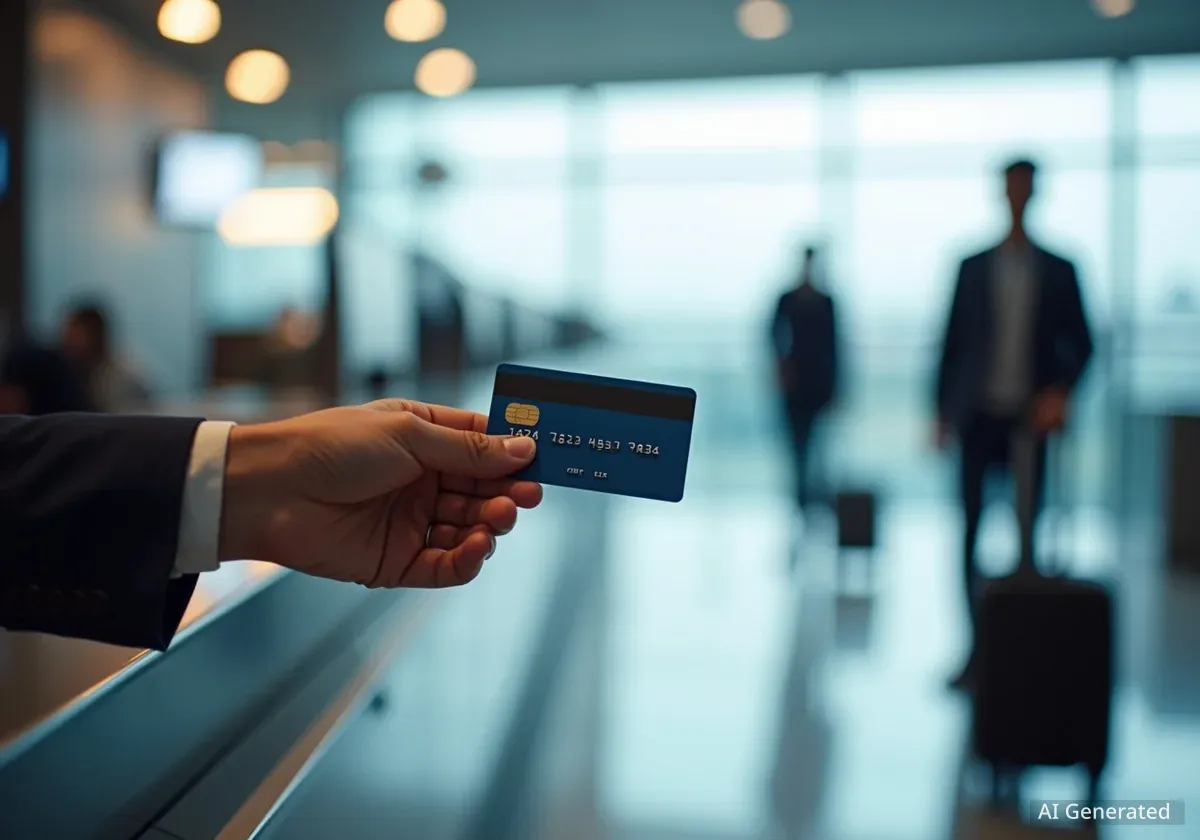Delta Air Lines has reportedly reinstated an older policy that requires international travelers to show the physical credit card used for ticket purchases. This rule, once common in the early days of online ticket sales, has led to significant issues for some passengers, including a recent case where a traveler faced buying a new ticket for thousands of dollars at London's Heathrow Airport.
Key Takeaways
- Delta Air Lines is enforcing an older rule requiring the original credit card for international flights.
- A recent passenger at London Heathrow faced a costly choice: produce the card or buy a new ticket.
- Other airlines, including Turkish and Japan Airlines, also reserve the right to ask for the card.
- Travelers can avoid issues by carrying the card or a photo, or by booking through a travel agency.
- Airlines use this measure to prevent fraudulent transactions, but do not publicize specific triggers.
The Resurgence of an Old Policy
In the past, presenting the credit card used for an airline ticket purchase was a standard security measure. This was especially true for international flights. Before advanced digital authentication methods became widespread, airlines often asked to see the physical card at the ticket counter. This practice helped verify the buyer's identity and prevent fraud.
Many travelers might not be aware that some airlines still maintain this policy. The requirement can surface unexpectedly, sometimes during the return leg of an international journey. This can put passengers in a difficult position if they do not have the card with them.
Important Fact
The practice of requiring the physical credit card at check-in was more common in the early 2000s when online ticket sales were still developing. It served as a primary defense against credit card fraud before the advent of multi-factor authentication systems.
A Passenger's Costly Surprise at Heathrow
A recent incident highlighted the impact of this revived rule. A Delta Air Lines passenger, returning to Seattle/Tacoma from an international trip, was checking in at London's Heathrow Airport. Delta representatives asked the passenger to present the credit card used for the ticket purchase. The passenger had left the card at home, leading to a significant problem.
The airline presented the traveler with a stark choice: either produce the credit card or purchase an entirely new ticket. The cost of a new international ticket can be substantial, often amounting to several thousand dollars. This situation caused considerable stress and financial risk for the passenger.
"The passenger was ultimately able to obtain a photograph of the credit card, which was enough to satisfy Delta representatives in London to allow them to board the flight."
How the Situation Was Resolved
Fortunately, the passenger managed to resolve the issue. They were able to obtain a photograph of the credit card. This digital image was accepted by Delta staff at Heathrow, allowing the passenger to board their scheduled flight. While this specific instance had a positive outcome, it underscores the potential for travel disruptions and unexpected expenses.
Airlines and Fraud Prevention
Delta is not alone in reserving the right to request the credit card. Other major carriers, such as Turkish Airlines and Japan Airlines, also state this policy on their websites. Airlines largely develop their own procedures for identifying and handling suspected fraudulent transactions. They also maintain different standards for what types of transactions they consider suspicious.
Airlines typically do not disclose specific details about what triggers their fraud detection systems. This discretion is intentional, as publicizing such information could help potential fraudsters circumvent security measures. Therefore, travelers often remain unaware of the exact circumstances that might lead to a credit card request.
Background Information
Credit card fraud costs the airline industry millions of dollars annually. Airlines implement various security measures to protect themselves and their customers. The physical credit card check is one method, though less common now, that some carriers still utilize, especially for certain international bookings or transactions deemed high-risk.
Strategies to Avoid Issues
Travelers can take steps to prevent encountering problems related to this policy. One straightforward solution is to simply carry the credit card used for the purchase. If carrying the physical card is not possible, having a clear photograph or digital copy of the card on a mobile device can sometimes suffice, as shown in the Heathrow incident.
- Carry the Card: Always bring the physical credit card used for the booking on international trips.
- Digital Copy: Keep a clear photo or digital scan of the card on your phone.
- Book Through Agencies: Booking via a traditional or online travel agency may reduce the likelihood of such requests.
Booking Through Travel Agencies
Industry experts, such as the blog View From The Wing, suggest that booking through a travel agency can be a way to mitigate this risk. The reasoning is that airlines hold travel agents accountable for preventing fraud at their own points of sale. This often makes airlines less likely to request additional verification from passengers at their check-in counters.
According to View From The Wing, certain types of bookings are more prone to triggering fraud alerts. These include last-minute mileage redemption tickets and tickets purchased from specific countries. Travelers making such bookings should be particularly prepared for potential verification requests.
Varying Airline Policies
Not all airlines enforce this rule. Carriers like Alaska Airlines, United Airlines, and American Airlines generally inform passengers that it is not necessary to carry the credit card used for the purchase. This difference in policy highlights the importance of checking an airline's specific terms and conditions before international travel.
Regardless of an airline's credit card policy, it remains good practice for international travelers to arrive at the airport well in advance. Airlines often recommend arriving up to three hours before scheduled international departures. This allows ample time to handle any unexpected issues, including potential credit card verification challenges, without risking a missed flight.
Being prepared with all necessary documentation, including potential credit card verification, can help ensure a smooth and stress-free international travel experience.





